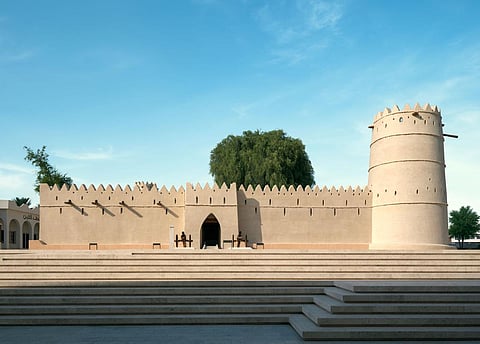Al Ain Museum reopens, blending heritage with innovation
The historic museum welcomes visitors with immersive exhibits and upgraded facilities

The project introduced new facilities and exhibition halls equipped with state-of-the-art interactive technologies, aligning with international standards for heritage museums.
The ceremony was attended by Sheikh Surour bin Mohammed Al Nahyan; Sheikh Nahyan bin Zayed Al Nahyan, Chairman of the Abu Dhabi Sports Council; Sheikh Dr Sultan bin Khalifa Al Nahyan, Adviser to the UAE President; Sheikha Latifa bint Mohammed bin Rashid Al Maktoum, Chairperson of the Dubai Culture and Arts Authority; Retired Lt General Sheikh Saeed bin Hamdan bin Mohammed Al Nahyan; Sheikh Zayed bin Hamad bin Hamdan Al Nahyan, Chairman of the National Anti-Narcotics Authority and General Supervisor of Police Heritage at Abu Dhabi Police; Sheikh Mohammed bin Hamdan bin Zayed Al Nahyan; Mohamed Khalifa Al Mubarak, Chairman of the Department of Culture and Tourism – Abu Dhabi; along with a number of sheikhs and senior officials.
During his visit, Sheikh Hazza toured the museum’s various sections to view key exhibits and archaeological collections that showcase the traditional customs and way of life of the region’s early inhabitants. The displays include agricultural tools, fishing equipment, and other artefacts reflecting the daily lives of past generations.
The museum also features archaeology halls that take visitors on a journey through ancient civilisations, displaying artefacts unearthed from historical settlements dating back thousands of years — such as pottery, iron arrowheads, and daggers discovered in the Jebel Hafeet and Qattara tombs.
Sheikh Hazza was briefed on the main stages of the restoration and redevelopment project, which expanded the museum’s total area from 1,200 square metres to 8,000 square metres. Following its transformation, the museum now houses 10 main galleries fitted with advanced visual and interactive display technologies. It also includes new facilities for visitors and researchers, such as a research centre, conservation and restoration laboratories, interactive learning spaces, a reading room, café, gift shop, and a temporary exhibitions hall.
Sheikh Hazza bin Zayed Al Nahyan emphasised that Al Ain Museum stands as one of the most prominent cultural landmarks in the nation’s history, being the first museum established in the United Arab Emirates. He noted that its reopening reflects the vision of His Highness Sheikh Mohamed bin Zayed Al Nahyan, President of the UAE, to continue the legacy of the late Sheikh Zayed bin Sultan Al Nahyan, the Founding Father, in preserving and safeguarding the UAE’s cultural identity and rich heritage for future generations.
Sheikh Hazza also commended the efforts of cultural and heritage institutions in protecting historical landmarks of national importance that embody the legacy and civilisation of the ancestors. He highlighted the importance of documenting and preserving the nation’s heritage to connect the past with the present and the future — instilling a deeper understanding of its historical and cultural value, and strengthening national identity among the UAE’s youth.
The Department of Culture and Tourism – Abu Dhabi announced last week that Al Ain Museum would reopen to visitors on October 24. The reopening follows a comprehensive redevelopment that expanded the museum’s area to more than 8,000 square metres while preserving the original building as a central feature of the new architectural design.
Established in 1969 by the late Founding Father, Sheikh Zayed bin Sultan Al Nahyan, may his soul rest in peace, Al Ain Museum is the first museum in the United Arab Emirates and remains a key reference for the archaeology and cultural history of the Al Ain region.
The museum’s collection and displays trace the story of human presence in the Al Ain area, featuring archaeological artefacts dating back more than 8,000 years, alongside a range of tangible cultural items that shed light on the traditions and practices of the local community. The museum also hosts exhibitions that explore the region’s deep-rooted heritage through to the present day.



